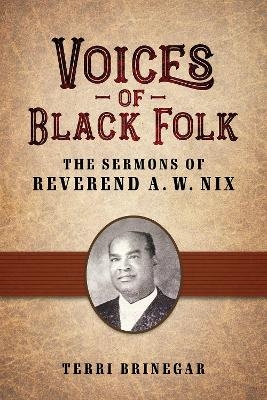
Voices of Black Folk
The Sermons of Reverend A. W. Nix
Seiten
2022
University Press of Mississippi (Verlag)
978-1-4968-3925-1 (ISBN)
University Press of Mississippi (Verlag)
978-1-4968-3925-1 (ISBN)
Through interviews, musical analyses, and examination of historical documents and relevant scholarship, Terri Brinegar argues that the development of the phonograph in the 1920s afforded preachers like Reverend A.W. Nix the opportunity to present traditional Black vocal styles of the southern Black church as modern Black voices.
In the late 1920s, Reverend A. W. Nix (1880–1949), an African American Baptist minister born in Texas, made fifty-four commercial recordings of his sermons on phonographs in Chicago. On these recordings, Nix presented vocal traditions and styles long associated with the southern, rural Black church as he preached about self-help, racial uplift, thrift, and Christian values. As southerners like Nix fled into cities in the North to escape the rampant racism in the South, they contested whether or not African American vocal styles of singing and preaching that had emerged during the slavery era were appropriate for uplifting the race. Specific vocal characteristics, like those on Nix’s recordings, were linked to the image of the "Old Negro" by many African American leaders who favored adopting Europeanized vocal characteristics and musical repertoires into African American churches in order to uplift the modern "New Negro" citizen.
Through interviews with family members, musical analyses of the sounds on Nix’s recordings, and examination of historical documents and relevant scholarship, Terri Brinegar argues that the development of the phonograph in the 1920s afforded preachers like Nix the opportunity to present traditional Black vocal styles of the southern Black church as modern Black voices. These vocal styles also influenced musical styles. The "moaning voice" used by Nix and other ministers was a direct connection to the "blues moan" employed by many blues singers including Blind Willie, Blind Lemon, and Ma Rainey. Both Reverend A. W. Nix and his brother, W. M. Nix, were an influence on the "Father of Gospel Music," Thomas A. Dorsey. The success of Nix’s recorded sermons demonstrates the enduring values African Americans placed on traditional vocal practices.
In the late 1920s, Reverend A. W. Nix (1880–1949), an African American Baptist minister born in Texas, made fifty-four commercial recordings of his sermons on phonographs in Chicago. On these recordings, Nix presented vocal traditions and styles long associated with the southern, rural Black church as he preached about self-help, racial uplift, thrift, and Christian values. As southerners like Nix fled into cities in the North to escape the rampant racism in the South, they contested whether or not African American vocal styles of singing and preaching that had emerged during the slavery era were appropriate for uplifting the race. Specific vocal characteristics, like those on Nix’s recordings, were linked to the image of the "Old Negro" by many African American leaders who favored adopting Europeanized vocal characteristics and musical repertoires into African American churches in order to uplift the modern "New Negro" citizen.
Through interviews with family members, musical analyses of the sounds on Nix’s recordings, and examination of historical documents and relevant scholarship, Terri Brinegar argues that the development of the phonograph in the 1920s afforded preachers like Nix the opportunity to present traditional Black vocal styles of the southern Black church as modern Black voices. These vocal styles also influenced musical styles. The "moaning voice" used by Nix and other ministers was a direct connection to the "blues moan" employed by many blues singers including Blind Willie, Blind Lemon, and Ma Rainey. Both Reverend A. W. Nix and his brother, W. M. Nix, were an influence on the "Father of Gospel Music," Thomas A. Dorsey. The success of Nix’s recorded sermons demonstrates the enduring values African Americans placed on traditional vocal practices.
Terri Brinegar has presented her research on African American voices at numerous conferences, including the American Musicological Society, the Society for Ethnomusicology, and the Association for Recorded Sound Collections. She is author of Voice and Stage Essentials for the Aspiring Female R&B Singer: A Guide to Technique, Performance, and Musicianship. And, she has performed for over twenty years in classic R&B and blues bands and has three professionally produced CDs of blues and jazz original compositions.
| Erscheinungsdatum | 18.03.2022 |
|---|---|
| Reihe/Serie | American Made Music Series |
| Verlagsort | Jackson |
| Sprache | englisch |
| Maße | 156 x 235 mm |
| Gewicht | 333 g |
| Themenwelt | Literatur ► Biografien / Erfahrungsberichte |
| Kunst / Musik / Theater ► Musik | |
| Sachbuch/Ratgeber ► Geschichte / Politik | |
| Religion / Theologie ► Christentum ► Kirchengeschichte | |
| Religion / Theologie ► Christentum ► Liturgik / Homiletik | |
| Sozialwissenschaften ► Ethnologie | |
| Sozialwissenschaften ► Soziologie | |
| ISBN-10 | 1-4968-3925-0 / 1496839250 |
| ISBN-13 | 978-1-4968-3925-1 / 9781496839251 |
| Zustand | Neuware |
| Haben Sie eine Frage zum Produkt? |
Mehr entdecken
aus dem Bereich
aus dem Bereich
von Athanasius bis Gregor dem Großen
Buch | Softcover (2024)
C.H.Beck (Verlag)
CHF 18,90
mein Leben mit Benedikt XVI.
Buch | Hardcover (2023)
Verlag Herder
CHF 39,90


